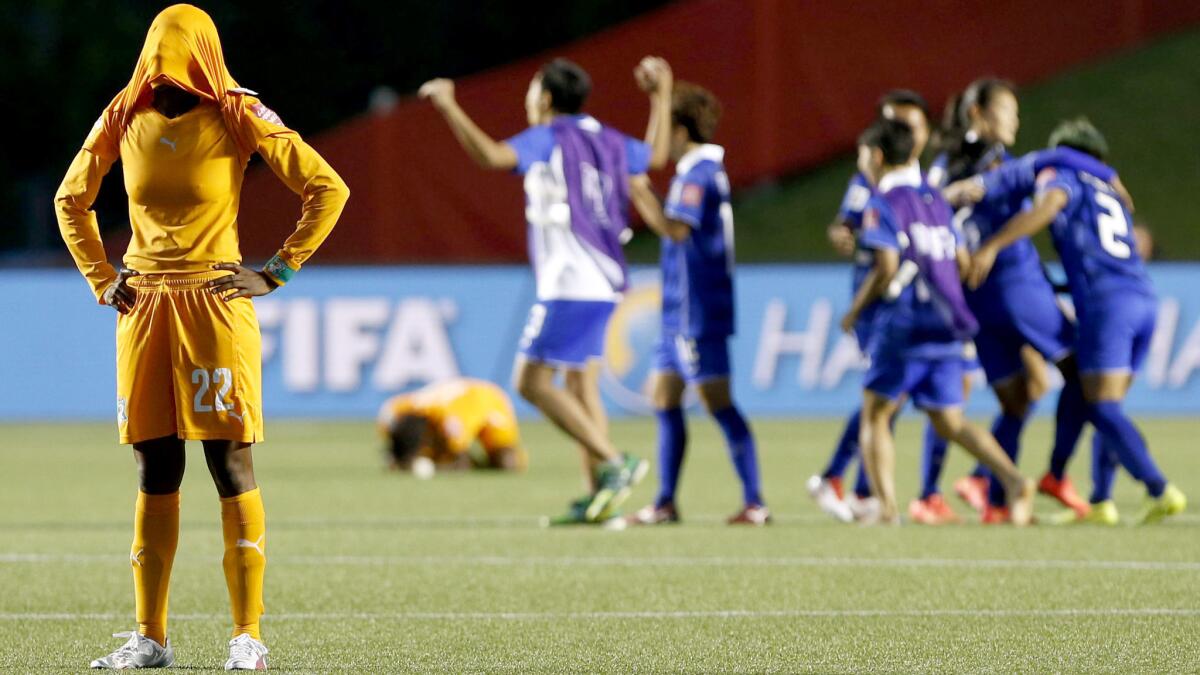Women’s World Cup newcomers suffer for the greater good

Ivory Coast’s Cynthia Djohore reacts after losing to Thailand in a Group B game of the Women’s World Cup on June 11. Ivory Coast had lost their opening game to Germany, 10-0, on June 8.
- Share via
Reporting from Ottawa — The players from Ivory Coast had no more frustration left in them.
With only a few minutes remaining on the clock, yet another ball sailed into their goal — this time on a free kick, a gently curving shot that slipped inside the far post.
The goalkeeper lay on the turf, her defenders turning quietly, trudging back toward midfield. Les Elephantes were headed for a 10-0 loss to Germany in their first-ever game at the Women’s World Cup.
“Our girls discovered something today,” their coach, Clementine Toure, said. “They discovered a high level of competition.”
The final score underlined a lingering concern at this monthlong tournament.
Soccer’s international governing body, FIFA, enlarged the field from 16 to 24 this time around, with eight nations making their debut on the sport’s biggest stage.
Critics doubt there are enough quality women’s teams in the world to fill an expanded bracket. They say lopsided scores could tarnish the World Cup’s reputation.
That has put pressure on newcomers such as Thailand, Ecuador and Cameroon to prove they belong. Ivory Coast has come under scrutiny as the 67th-ranked team in the world, reaching the draw by way of upset victories in regional qualifying.
Asked if her squad deserved to be in Canada, Toure answered sharply — “We earned our place here” — then added: “Of course there have been some worries.”
::
Women made their World Cup debut in 1991 with a dozen teams gathering to play in China. Michelle Akers scored in the 78th minute to give the United States a 2-1 championship win over Norway.
It took eight more years before officials became convinced the women — so long in the shadow of the men — had progressed sufficiently to support a 16-team field. That number remained constant until embattled FIFA President Sepp Blatter announced an expansion after the 2011 tournament.
“That’ll open up new markets for women’s football,” Blatter said at the time. “The final will now be played to an audience on both sides of the world, from the East where the sun rises, all the way to the West.”
To that point, his most noteworthy pronouncement on the women’s game had been a 2004 comment in which he suggested the players wear tighter shorts.
The decision to expand triggered a chicken-and-egg debate.
Critics insist that lower-ranked soccer programs will never reach a high level of play unless their governments devote more money to coaching, facilities and travel. While established teams arrived in Canada more than a week in advance to acclimate to conditions and the time change, the Ivory Coast squad landed only four days before play began.
Supporters of a larger bracket argue that inviting additional teams to the World Cup might be part of the solution.
“This is like a transfer period where the difference between the teams will be big,” said Nora Holstad Berge, a veteran defender for Norway. “But the new teams get some more publicity back home and that will bring the resources.”
An infusion of money wouldn’t be the only potential benefit. There is another argument in favor of a larger tournament.
This World Cup is giving newcomers a chance to face powerhouse opponents who, under normal circumstances, might not even grant them an exhibition game.
::
A new practice field stands on the outskirts of Ottawa, a sparkling rectangle of synthetic turf plopped down amid trees and brush. In late afternoon, a bus pulls up and the Thai players spill out, smiling, chatting, laughing.
Their first World Cup game ended in a 4-0 loss to Norway, but they had reason to feel upbeat.
The Thais were physically overmatched against an opponent that outran them to loose balls and muscled them aside in the box. Still, they maintained their technique and played hard through the final whistle.
The crowd at Lansdowne Stadium warmed to them as underdogs, cheering every save, every dash down the field.
“The goal is to enjoy ourselves and try our best,” goalkeeper Waraporn Boonsing said through an interpreter. “If we play that way, we don’t worry about the result.”
Their coach, Nuengrutai Srathongvian, has preached this message from the start. Her players need to see what top-flight soccer looks and feels like, she said. They need to endure tough losses for the greater good.
“The most important thing is to transfer that experience back to younger generations back in Thailand,” Srathongvian said.
The Ivorians headed for Canada with a similar attitude, but have found it harder to remain cheerful.
During the loss to top-seeded Germany, players threw their hands in the air after mistakes, yelling at officials and each other. Two days later, at a recreation center in the suburbs, they began practice with a mood every bit as gloomy as the gray skies overhead.
The team formed a circle at midfield, joining hands, bowing heads to pray. Then came warmup drills, with only the thump of kicked balls to break the silence.
When a reporter asked to speak with players afterward, the team representative shook his head, saying: “Right now, we work, work, work.”
::
The other teams making their debut at this World Cup are Switzerland, Spain, Costa Rica and the Netherlands. Through the first five days of competition, the newcomers combined for a respectable record of two wins, four losses and two ties — though one of the victories and both ties came against one another. Things got out of hand when Switzerland pounded Ecuador, 10-1, on Friday.
With Ivory Coast facing Thailand on Thursday, at least one more fledgling squad would record its first World Cup victory.
The Ivorians scored quickly on a scramble in front of the net, bodies flying. Their fans, dressed in bright orange, banged on drums and gyrated in celebration, but things went south after that.
Thailand answered with three goals over the next 70 minutes, twice on plays that appeared to be offside. Though the Thais gave up a late score, Boonsing made a scrambling save in the final seconds to preserve a 3-2 victory.
“We feel that we are really lucky,” Srathongvian said.
For Ivory Coast, the match ended with forward Ange Nguessan sprawled before the opposing goal, slamming her fist on the turf. Not only had the team from West Africa suffered another disappointment, but more trouble lay ahead.
Next comes a Monday game against the Norwegians, who managed a surprising 1-1 tie against Germany. Once again, the Ivorian coach will remind her players to stay positive.
At this Women’s World Cup, with so many young teams getting their first taste of elite soccer, winning isn’t the only measure of success.
“We’ve played against big teams, we are going back with big lessons,” Toure said. “We believe that we will be able to use those lessons.”
Twitter: @LATimesWharton







